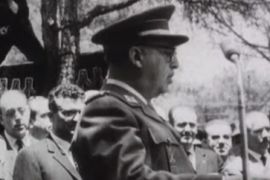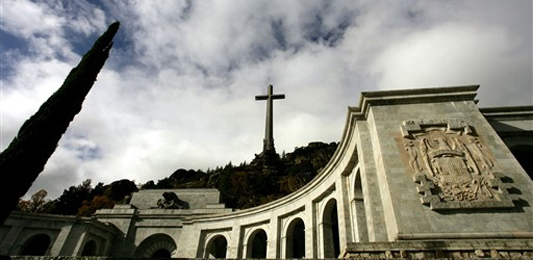Spain digs up painful past
New law aims to recognise rights of those killed in country’s civil war.

 |
| The law calls for the removal of statues and monuments put up by the regime [AFP] |
Spain is reliving painful memories from its past as parliament prepares to debate a bill that aims to “recognise and increase the rights” of those who were persecuted during Spain’s 1936-39 civil war and subsequent dictatorship.
Following the death of General Francisco Franco in 1975 after nearly 40 years of Fascist rule Spanish politicians agreed to a “Forgetting Pact”, designed at putting the war and the dictatorship behind them.
The country entered a period of sustained social and economical growth, eased by a smooth transition to democracy and membership of the European Union.
But in recent years, the so-called forgetting pact has begun to unravel as groups campaigning for the rights of victims have called for the recovery of forgotten human remains from unmarked mass graves.
| In video |
|
– An international brigades veteran tells Al Jazeera his story |
Historians estimate that about half a million people from both sides were killed in the civil war, provoked by Franco’s nationalist uprising against an elected left-wing republican government.
A further 50,000 people, mainly Republican sympathisers, were executed by Franco’s forces during his military dictatorship. Many were buried in mass graves while tens of thousands more were imprisoned.
The text of the draft of the new law of historical memory that will be debated in parliament on Wednesday says it is aimed at “strengthening values and democratic principles”.
The draft says it will do this by “helping the facts and circumstances of the civil war and the dictatorship to become known and ensuring the preservation of documents linked to the historical period”.
Unhealed wounds
The law recognises the “extremely unjust character of all convictions, sanctions and violence” during the civil war and the ensuing dictatorship of General Franco, which lasted until his death in 1975.
The debate has reopened wounds in a country that does not seem to have fully reconciled itself with its past.
Al Jazeera’s Tim Friend visited a mass grave in the village of Arandiga near the city Zaragoza in the northeast of the country.
Families waited as each body was slowly recovered.
One elderly man helping dig for his brother said: “It’s a good day, they’re coming home.”
Antonio Cabello Garcia’s father was killed during the civil war.
He says the law is a necessary one. “Not for revenge,” he says. “But so people know how much everyone suffered, people on both sides.”
The law declares Franco’s military courts as illegitimate, provides compensation for victims, and removes symbols such as street names and church plaques honouring Franco.
The text of the new legislation also says the wishes of descendants of victims will be taken into consideration.
‘Debate about the past’
As a result, the body of the best-known victim of the civil war, the poet Federico Garcia Lorca, who was shot by Franco’s Nationalists, is unlikely to be exhumed.
His family has opposed any moves to dig up the ditch in the southern city of Granada where his body and those of three other Republicans were thrown in August 1936.
|
|
| Antonio Cabello Garcia, left, lost his father in the war and welcomes the new law |
Jose Zapatero, the Socialist prime minister, who is putting forward the law and whose own grandfather was killed by a firing squad, says he wants to address the grievances of those forgotten during the country’s dash to democracy.
Consequently a new documentation centre on the civil war and the dictatorship would be set up in the western city of Salamanca.
But critics say the legislation is a simplistic, one-sided view of history during which both sides committed atrocities.
On Sunday, in what many saw as a retaliatory move, the Vatican beatified, a record 498 people, nearly all clergy, killed by left-wing militias fighting for the Republicans in 1936.
But campaigners have generally welcomed the move.
“I think it is very important this law because for the first time since the death of Franco, we have a debate about the past,” Emilio Silva who works for the association of historic recovery and whose grandfather was killed by a death squad during the civil war, says.
“I think this is very healthy for our country.”

